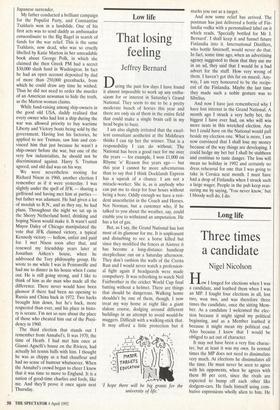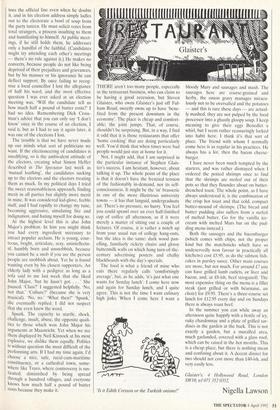Long life
Three times a candidate
Nigel Nicolson
How I longed for elections when I was a candidate, and loathed them when I was an MP. I fought four elections in all, lost two, won two, and was therefore three times the candidate, once the sitting Mem- ber. As a candidate I welcomed the elec- tion because it might signal my political beginning, and as a Member loathed it because it might mean my political end. Also because I knew that I would be obliged to act out of character.
It may not have been a very fine charac- ter, but at least it was my own. In normal times the MP does not need to dissimulate very much. At elections he dissimulates all the time. He must never be seen to agree with his opponents, when he agrees with them 80 per cent, since the rivals are expected to bump off each other like dodgem-cars. He finds himself using com- bative expressions wholly alien to him. He toes the official line even when he doubts it, and in his election address simply ladles out to the electorate a bowl of soup from the party tureen. He must solicit votes from total strangers, a process insulting to them and humiliating to himself. At public meet- ings, if he still holds them, he addresses only a handful of the faithful. (Candidates might try attending each other's meetings — there's no rule against it.) He makes no converts, because people do not like being deprived of their prejudices and grievances, but by his manner or his ignorance he can deflect support. By once failing to recog- nise a local councillor I lost the allegiance of half his ward, and the most effective question I was ever asked at an election meeting was, `Will the candidate tell us how much half a pound of butter costs?' I had no idea. Remembering Dick Cross- man's advice that you can only say `I don't know' once in the course of an election, I said it, but as I had to say it again later, it was one of the elections I lost.
The trouble is that we have never made up our minds what sort of politicians we want. If the electioneering of candidates is unedifying, so is the ambivalent attitude of the electors, creating what Simon Heifer described in The Spectator last week as `mutual loathing', the candidates sucking up to the electors and the electors treating them as muck. In my political days I tried the sweet reasonableness approach, finding merit in all parties but slightly more merit in mine. It was considered kid-glove, feeble stuff, and I had rapidly to change my tune, becoming aggressive, simulating fire and indignation, and hating myself for doing so.
At the highest level this is also John Major's problem. In him you might think you had every ingredient necessary to attract popular acclaim. He is young, cour- teous, bright, articulate, sexy, unintellectu- al, humbly horn and unsnohbish, because you cannot he a snob if you are the person people are snobbish about. Yet he is found wanting even by his closest supporters. An elderly lady with a pedigree as long as a sofa said to me last week that she liked John Major, `but he hasn't got.... ' She paused. `Class?' I suggested helpfully. `No, not that.' Culture?' (because she is very musical). `No, no.' What then?' Spunk,' she eventually replied. I did not suspect that she even knew the word.
Spunk. The capacity to startle, shock, challenge, insult, abuse, the opposite quali- ties to those which won John Major his arguments at Maastricht. Yet when we see them displayed by Neil Kinnock at his most explosive, we dislike them equally. Politics Is without question the most difficult of the performing arts. If I had my time again, I'd choose a nice, safe, rural-cum-maritime Constituency, or a cathedral town, some- where like Truro, where controversy is rus- ticated, diminished by being spread through a hundred villages, and everyone knows how much half a pound of butter costs because they make it.



























































 Previous page
Previous page